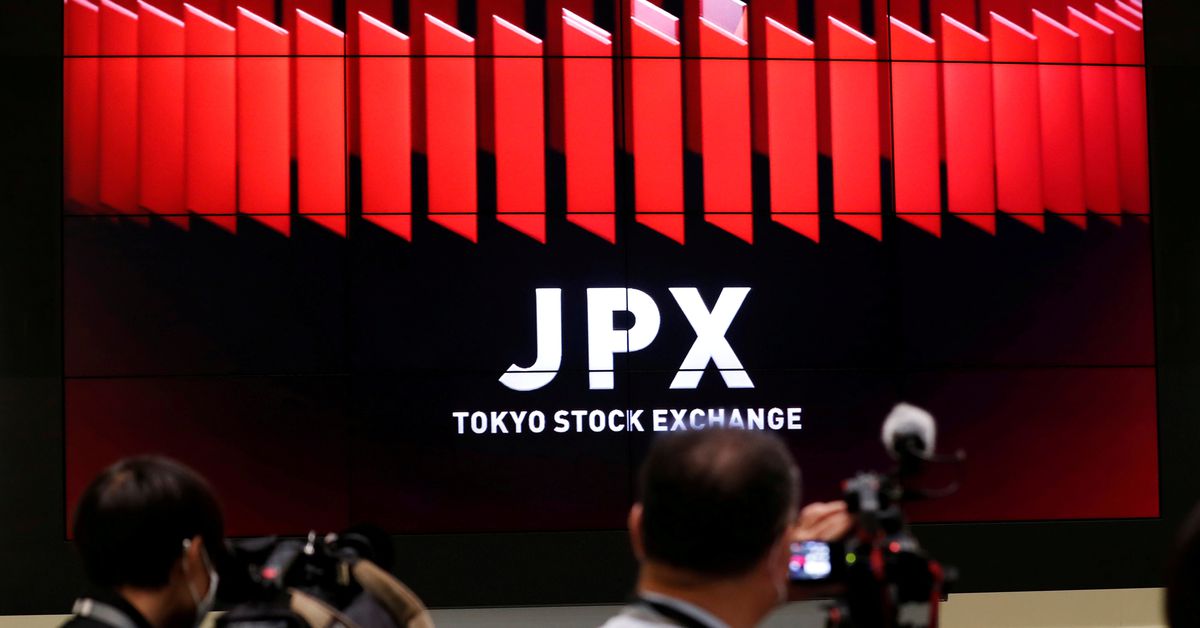TV camera men wait for the opening of market in front of a large screen showing stock prices at the Tokyo Stock Exchange in Tokyo, Japan October 2, 2020. REUTERS/Kim Kyung-Hoon
- U.S. CPI rises at fastest pace since 1990, roiling markets
- Broad-based inflation challenges Fed’s “transitory” narrative
- Dollar hits 15-1/2-month high on bets for earlier rate hikes
- Treasury yields jump while breakeven rate soars to record high
- Australia leads decline in Asia stock markets
TOKYO, Nov 11 (Reuters) – Inflation fears pressured Asian stocks and buoyed the dollar on Thursday after data overnight showed U.S. consumer prices surged at the fastest pace since 1990 last month, boosting the case for faster Federal Reserve policy tightening.
Nominal U.S. Treasury yields shot higher, with that on the benchmark 10-year note leaping by the most since February, while real yields, which take inflation into account, dipped to record lows.
Gold jumped to a five-month high and bitcoin hit a record as investors sought inflation hedges.
Oil pulled back sharply from near seven-year highs after U.S. President Joe Biden said his administration was looking for ways to reduce energy costs.
MSCI’s broadest index of Asia-Pacific shares outside Japan (.MIAPJ0000PUS) was down 0.85%, led by a 1.19% slide in Australia’s benchmark (.AXJO).
Chinese blue chips (.CSI300) slipped 0.09%.
Japan’s Nikkei (.N225) bucked the trend by rising 0.24%, supported by the yen’s weakness against a resurgent dollar and as U.S. stock futures ticked up slightly.
Overnight though, the S&P 500 (.SPX) tumbled 0.82%, its worst day in more than a month. That marked the first back-to-back declines in a month, after the index closed at a record peak to start the week.
The dollar index , which gauges the currency against six major peers including the yen and euro, hovered just below the high reached on Wednesday of 94.905, a level not seen since July of last year.
The greenback added 0.13% to 114.04 yen , up from as low as 112.73 at the start of the week.
The U.S. consumer price index surged 6.2% on an annual basis, with gasoline leading a broad-based increase that added to signs that inflation could stay uncomfortably high well into 2022 amid snarled global supply chains. read more
Inflationary pressures are also brewing in the labor market, with other data on Wednesday showing the number of Americans filing claims for unemployment benefits fell to a 20-month low.
Both the White House and the Fed have maintained that prices will fall once supply bottlenecks start easing, with the central bank only last week reiterating that high inflation is “expected to be transitory” as policy makers urged patience.
“The Fed’s resolve is facing a testing time,” Rodrigo Catril, a senior foreign-exchange strategist at National Australia Bank in Sydney, wrote in a client note.
“Supply constraints may well turn out to be transitory, but the rise in core drivers increases the pressure on the Fed to trigger a monetary policy response.”
The money market now prices a first Fed interest rate increase by July.
Benchmark 10-year Treasury yields jumped the most in seven weeks to as high as 1.592% on Wednesday. The Treasury market is closed globally Thursday for a U.S. holiday.
Meanwhile, the yield on 10-year Treasury Inflation-Protected Securities (TIPS) dipped sharply to as low as an unprecedented -1.243% before drifting higher over the course of the session.
Inflation expectations soared, with the five-year breakeven inflation rate soaring to a record 3.113%
The volatility spilled into other markets, with the CBOE Volatility index (.VIX), Wall Street’s so-called fear gauge, touching its highest level in nearly one month.
Spot gold traded around $1,850 after surging as high as $1,868.20 overnight for the first time since mid-June.
Bitcoin initially leapt to a new record high of $69,000 before retreating to last trade just below $65,000.
U.S. West Texas Intermediate (WTI) crude gained 25 cents to $81.59 per barrel, but well off the overnight high of $84.97 and seven-year peak of $85.41 reached late last month.
Brent crude futures rose 30 cents to $82.94 a barrel, but down from as high as $85.50 on Wednesday and October’s three-year peak of $86.70.
Editing by Lincoln Feast
Our Standards: The Thomson Reuters Trust Principles.





